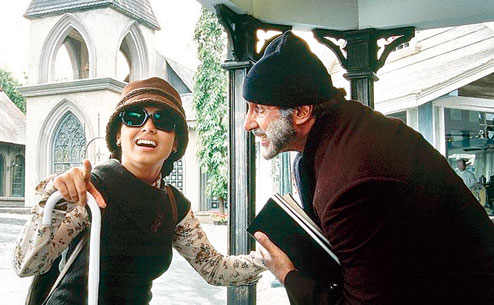 |
| Persons with disabilities, like Michelle in the film Black, will be able to research at the proposed resource centre at National Library |
A Resource Centre for the Variously Challenged, set to open at the National Library by March, promises to help Calcutta catch up with other cities in providing facilities for the disabled.
“The project was taken up last year. The draft proposal was circulated among experts, who met in Delhi in June. The expert committee has finalised the proposal. We will begin with Rs 25 lakh but we shall need more as we go along. We should be able to start the first phase by March,” says Swapan Chakravorty, director-general, National Library.
The spot chosen for the resource centre is above the main reading room at Bhasha Bhavan, near the proposed Electronic Resource Centre. Braille books will be stocked in a 2,500sq ft area in the basement of the building.
“Most major libraries in the West have arrangements for the visually impaired. There are also special libraries. In the US, to take stray instances, there is Washtenow Library for the Blind and Physically Disabled, a free service provided by the Ann Arbor District Library, and in the UK, the Perth Library for the Disabled. In India, a few libraries have already taken this initiative,” says Chakravorty.
Hena Basu, the secretary of the Society for the Visually Handicapped, Calcutta, feels facilities for empowering the visually impaired with research assistance are restricted in Calcutta compared with the other metros. According to her, the reasons are lack of awareness and indifference “of the universities towards providing appropriate access although enough funds are available with the UGC”.
“We always had to beg friends to accompany us to the libraries and read out books to us or we have had to hire professional readers and depend on their convenience. Braille books are so bulky most libraries don’t like storing them and talking book CDs are also not readily available,” said Alefiya Tundawala, who overcame visual impairment to get a doctorate in political science from Calcutta University.
A teacher at Savitri Devi College, Burrabazar, Alefiya feels libraries could make a huge difference by investing in speedy scanners and hiring guides for people with special needs.
The National Library hopes to remedy the situation by setting up a comprehensive resource centre. “We shall use Braille, reading and aural software, daisy printers, magnifiers for those with low vision, study furniture for those with various disabilities,” says Chakravorty.
The library will have software that reads aloud what is on the computer screen so that the visually impaired can access digital content more freely. Users of such software will also be able to create documents and edit notes.
The Refreshable Braille Display, on the other hand, will allow users to access documents, spreadsheets, and websites through Braille. It is expected to be especially suitable for those with dual sensory loss (such as those with visual and hearing impairment).
The centre is expected to come in handy for senior citizens, those with learning disabilities, neo-literates and illiterates.

